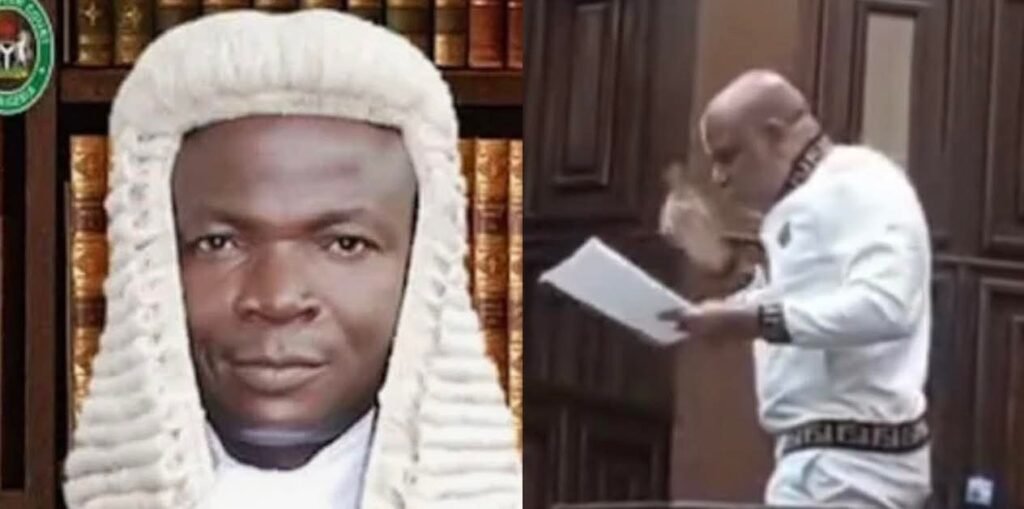Would Nnamdi Kanu still be standing trial after five years if he were not Igbo? This question frames what is proving to be a flawed criminal trial, one that could have far-reaching consequences for the political development of Ndi-Igbo in Nigeria.
Let’s highlight a few key points. The rule of law means that anyone who commits a crime should face trial and, if found guilty, serve their sentence. This is the expectation in a society governed by law. However, it would be a stretch to say that Nigeria currently embodies the rule of law. The country pretends to adhere to such principles, but in a true rule of law state, there would be one law for everyone—the privileged and the underprivileged alike. Does Nigeria resemble such a society? Consider the terrorist kingpin in one of the northern states who held a peace meeting while openly displaying his weapons and brazenly explained that he breached the initial deal because the government betrayed him. That individual remains free and not facing trial. Reflect on those who stoned Deborah to death; they identified themselves and proclaimed they did it for Allah, vowing to do it again. The Sokoto and federal government rewarded them with freedom. Clearly, Nigeria does not operate as a rule of law state.


Thus, the issue in Nnamdi Kanu’s case is not whether it aligns with the rule of law—since Nigeria is not genuinely a rule of law state—but rather about political justice and political wisdom.
The struggle for Biafra has been ongoing for a long time. This struggle divides Nigerians, including Igbos. Many see it as a futile endeavor, while others believe it is the only path to redemption for Ndi-Igbo in Nigeria. There is nothing criminal about advocating for Biafra through a referendum; such advocacy is not treasonous in itself.
It’s important to acknowledge that the struggle and agitation for Biafra have become violent, resulting in numerous deaths—some at the hands of misguided agitators and many (if not most) at the hands of Nigerian security personnel, who appear to have a deadly agenda against Igbo youths. The degeneration of the Biafran struggle and agitation represents a tragic development for ala-Igbo. We have lost more than we gained; it is a disaster. However, we must not exacerbate this situation through the mishandling of Nnamdi Kanu’s trial.
From a legal standpoint, examining the charges against Nnamdi Kanu, it seems there is no direct evidence linking him to any murders that occurred in the Southeast. While incitement to violence and speech against the Nigerian state may suggest moral culpability, they do not provide sufficient proof of criminal involvement in specific murders.
Setting aside legal considerations for a moment, it is crucial to understand that every legal trial is, in some respects, a political trial. The state decides to prosecute crimes and has the authority to terminate proceedings even before trials conclude. This is why the constitution grants the Attorney General the power to terminate trials, irrespective of their merits, recognizing that such termination may serve the broader interests of society. This decision is inherently political, and, consequently, the courts cannot review it.
The vital question is whether there is enough public interest to warrant exercising the power to end Nnamdi Kanu’s trial. The answer is yes. The entire context of the trial is political, focused on the politics of separatist agitation. The rendition from Kenya and various human rights violations have tarnished the integrity of the trial. The refusal to comply with certain court orders has depraved the proceedings of legitimacy, leading many to perceive it as a political persecution—as demonstrated by the hundreds who protested yesterday. Conversely, there are also many, even within the Southeast, who believe that the trial should proceed and that Nnamdi Kanu should face imprisonment.
Ultimately, the outcome will hinge on political considerations. Which political calculation will bolster Bola Tinubu’s prospects for the 2027 elections? A challenging fact for Nnamdi Kanu’s supporters is that the Southeast does not possess many votes to offer in this political equation. If we could demonstrate the potential to deliver four million votes against Bola Tinubu in 2027, the inclination might shift towards halting the trial. Unfortunately, due to the collective negligence of IPOB, we have become a political minority. We do not register to vote, and as a result, we lack significant influence in political matters. Shameful indeed.
So, what should happen? I believe the political leaders in the Southeast should intervene and work towards securing a presidential termination of the trial. This is vital because a conviction and imprisonment would destabilize the region further. The backlash from the realization that terrorists from the North who have waged war against Nigeria have been offered amnesty and peace deals, while Nnamdi Kanu faces a criminal trial and potential imprisonment, would be detrimental to Nigeria, the Southeast, and the integrity of the criminal justice system. Continuing the trial serves no beneficial purpose.
The significant political lesson for Ndi-Igbo is this: it is a mistake to underestimate the role of politics in the quest for justice for Igbos in Nigeria. Even if the ultimate goal is Biafra, achieving it is only feasible through democratic political engagement, not misguided agitation.
Copyright Warning!
Disclaimer
Just to let you know, comments expressed here do not reflect the opinions of OHAFIATV News or any employee thereof. Also, every opinion expressed in any article is strictly that of the author(s), except where otherwise stated.
ATTENTION: Stay informed and ahead of the curve! Follow OHAFIATV on WhatsApp for updates! CLICK HERE!
Have any thoughts?
Share your reaction or leave a quick response — we’d love to hear what you think!








